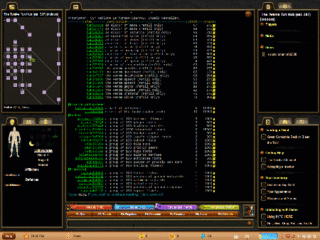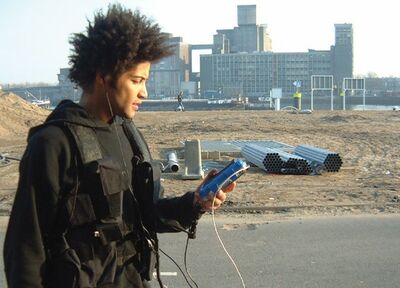Louisa-project proposal
What do you want to make?
A location-based game, blurring the boundaries of the “magic circle”[1], seeing the latter as a temporary rule set which differs from the behavioural code within the society outside of its imaginary framework. I am interested in creating scenarios within public spaces of Rotterdam in which players will need to solve puzzles in order to unlock a new stage of a narrative. This multi-player game will be driven by objectives to be found an online platform, connecting areas within this virtual space with physical locations. Unlocking a physical lock might open up a new area in the web game and vice versa. Potential sceneries of real-life gameplay are supermarkets, internet cafés, night shops, parks and metro stations for example. The core topic revolves around personalised, location-based targeted content under the veil of ludification. The core mechanisms and visual language bridge 1990 and early 2000s online role-playing environments with current developments of playbour[2] and automation.
How do you plan to make it?
There will be different components connecting a web game with a Multi-User Dungeon style interface to escape game puzzles in public spaces. For the web game I will set up a server with a php database, connected to wireless arduinos in different locations of the city. I will look for locations where certain game mechanics, albeit not explicit, are already in place. For example unlocking a locker with a number code at central station. I will write a narrative and reveal parts of the plot in stages/levels of the gameplay through a text-based interface. In order to make sure the game is not too hard or too easy, I will plan several test moments with small groups :) I am planning to work on the electronic puzzles together with tech collective Telemagic at their studio in Rotterdam.
What is your timetable?
| November 2021 | A performative, location-based game for The Overkill Festival in Enschede titled EtherAxis. Taking place on the 28th November and 5th December. |
| December 2021 | I will review EtherAxis, taking note of what methods I want to build out further and which parts to leave out. I will start to make interface sketches, researching game methods, virtual "stage-setting" & role-play common on 1990s and early 2000s online platforms.
This will help me choose how to design the web game. I will pet my cat a lot over Christmas break to charge my battery. |
| January 2022 | Development Week at TETEM to build locks/containers and play test with audience. Talk to experts.
Prototype puzzles at Telemagic's studio. I will start location scouting to get inspiration for the narrative and how to link it to the city. |
| February 2022 |
In this month I want to focus on storytelling, reading fiction and writing the narrative. |
| March 2022 | I want to build some mystery around the game and start creating untraceable manifestations around it. This is the time it will slowly launch and spread. |
| April 2022 | |
| May 2022 | |
| June 2022 |
Why do you want to make it?
Personally I am interested in the ways in which virtual worlds pull us in and dissociate us from our physical environments. From a young age I was interested in the meaning of a common reality and now as a maker I am searching for the moments this common reality noticeably crumbles. I am noticing the process of extreme personalisation of content online which is one of the causes reality is crumbling, which I expect to extend further and further into the spaces outside of the screen. For that reason I am to explore the experience of mistaking games for reality and vice versa, along with the feelings and social implications which follow. I would like to encourage players to look closely in order to find hints which would have otherwise blended into the environment smoothly.
Who can help you and how?
Tomo Kihara (game designer)
My name is Tomo Kihara — research driven designer making playful interventions that provides a new perspective to complex socio-technical problems.
Tomo wrote his Master's thesis about an escape game, which he built and executed in Amsterdam in 2018. He is experienced with gamified interventions in public space and how to integrate the used methods with the storyline to create a cohesive experience. I am planning to share my progress with him and discuss ways of making relevant puzzles.
Roos Groothuizen (artist & designer)
My name is Roos Groothuizen. I am an independent media artist and designer who dances on the borders of interaction, theater, intervention, web, film, games and animation.
Who is in control over what I perceive? Fascinated with the unfair distribution of information and how online algorithms systematically discriminate us, my work reflects on in-depth research and recent developments, often with interactive or game-like elements. Fun with a serious undertone.
Roos is great and knows a lot about everything. She also set up a conceptual escape room in TETEM this year, powered by a raspberry pi server connecting a series of automated, multi-media puzzles. Starting in January, we will be sharing a studio and I plan to develop the storyline and puzzles in dialogue and with guidance from Roos.
Emilia Tapprest (film maker and performer)
"nvisible.studio is the independent research practice of Finnish designer and filmmaker Emilia Tapprest (b. 1992). She is currently enrolled at Filmforward’s Vrijplaats residency and Stimuleringsfonds’ Talent Development programme 2021-22. Her research explores the role of value paradigms in emerging technocultural developments through worldbuilding and cinema, working closely with historian and music producer Victor Evink (S x m b r a). Their works as a duo Liminal Vision tackle themes such as human connectedness and agency in the quantified age, exploring how a system's underlying logic produces particular ‘affective atmospheres’ in interaction with its social fabric."
Emilia has an amazing sense of creating a special atmosphere, through subtleties such as scents. We have been working together to create Earthrise and EtherAxis and she has been a huge source of inspiration with her world-building and research project Zhouwei Network. I hope to bounce some ideas back and forth and maybe even collaborate on this project in a similar way as with the previous games.
Relation to previous practice
As a maker, my focus lies heavily on tools of interaction and gamification, interlinking digital and physical spaces. I am working with themes around gaming and the effect of new technologies on the player's perception of reality. By analysing gameplay methods and implementing them into RL settings, I am creating scenarios in which the viewer turns into the protagonist of an interactive fictional narrative. More specifically I am intrigued by the mental process of dissociation, methods of ludified surveillance capitalism and personalised virtual echo-chambers social media platforms construct based on user data. Since 2018, I have been experimenting with different event formats, testing game methods with small live audiences. These tests range from escape rooms to immersive theatre, treasure hunts and audio tours. This project will combine a lot of my findings and deepen this ongoing research on a technical and theoretical level.
Ultimate Dragon
2019. keywords: text-based game, surveillance capitalism, personalisation
Earthrise
2021. keywords: location-based game, audio narrative, navigation
Relation to a larger context
I am inspired by Multi-User Dungeons which were one of the first role-playing chat environments of the early internet. The weird overlap between fact and fiction that they have caused and how this has inspired novelty game formats such as Alternate Reality Games. In the early 2000s, there was a time these type of games were quite common, but nowadays they seem to have vanished. Games like "Blast Theory: Can you see me now? 2001." relate strongly to my own approach and I am drawing inspiration from their documented interventions. In the meantime, Escape Rooms have risen in popularity. Fast forward to 2018, where Tomo Kihara executed a city game called "Escape the Smart City", imagining an overpowering computer system which automizes surveillance. In 2020, Covid 19 causes a number of lockdowns worldwide, closing down cultural institutions and shops, leaving only the city streets as a platform of distributing art. A general worry and discourse around an Infocalypse seems to be a red thread in the cultural sector within digital art. In 2021, Roos Groothuizen executed her conceptual escape room called: I want to delete it all, but not now.
My goal is to make a more visible link between the first role-playing platforms and today's puzzling take on fiction.
Bibliography
[1] Huizinga, Johan (1955). Homo Ludens: a Study of the Play-Element in Culture. Boston, MA: The Beacon Press.
[2] Zuboff, S. (2019). The age of surveillance capitalism the fight for the future at the new frontier of power. London Profile Books.


